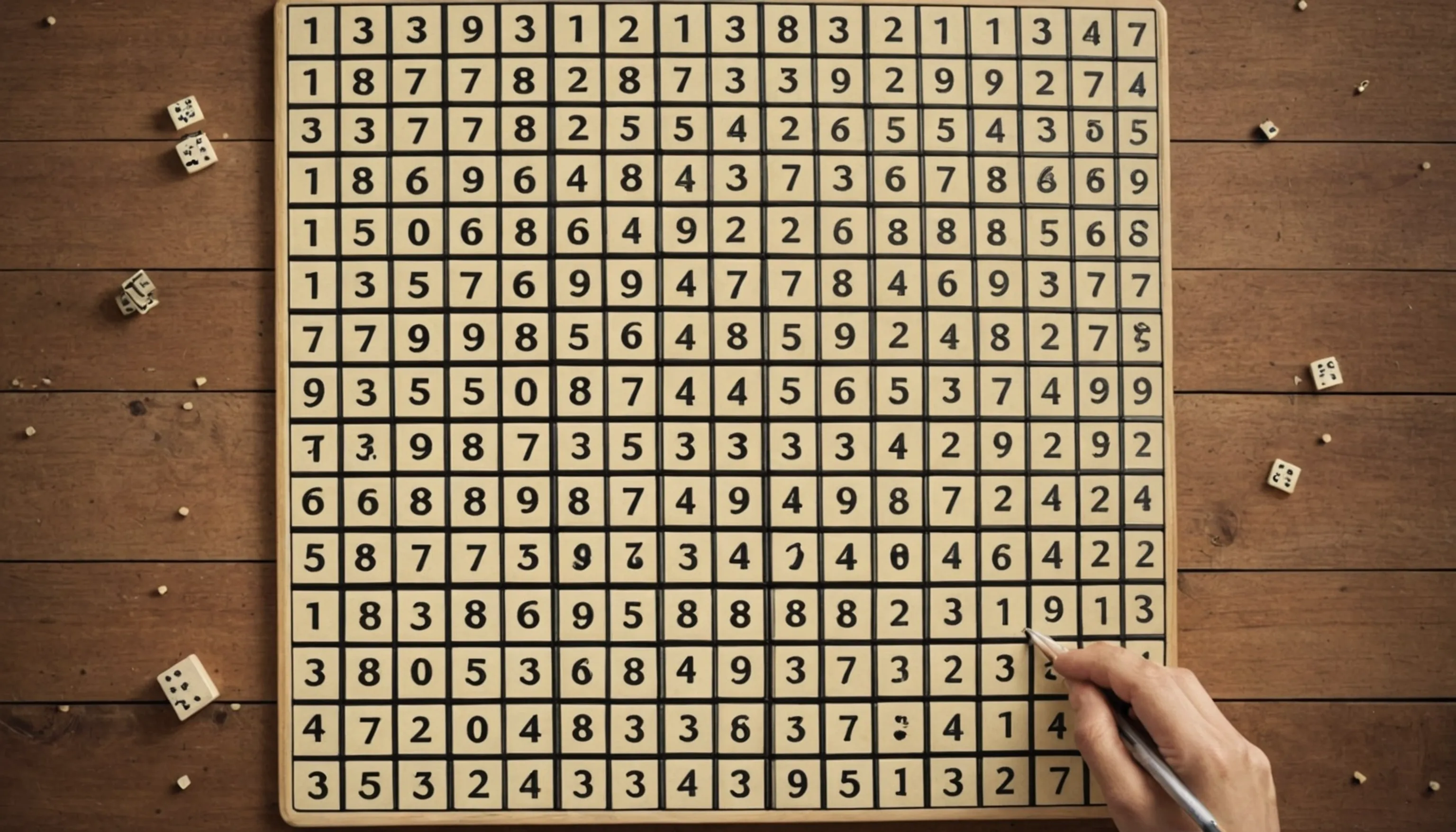Math Games to Improve Problem-Solving Skills
 HvWHenry van Wagenberg
HvWHenry van Wagenberg
Math Games to Enhance Problem-Solving Skills
Math games are a fantastic way to enhance problem-solving skills in teenagers. They not only make learning math fun but also engage critical thinking and creativity. By participating in these games, teens can tackle various mathematical challenges in a playful environment, which encourages them to think outside the box.
Moreover, these games often involve teamwork and competition, fostering collaboration and communication skills. As students face different scenarios and puzzles, they learn to approach problems from multiple angles, ultimately building resilience and confidence in their mathematical abilities.
Why Math Games are Effective for Problem Solving
Math games are highly effective tools for enhancing problem-solving skills among teenagers for several reasons. First, they create a stimulating environment that encourages engagement and participation. When students are playing games, they are often more motivated to solve problems, as the competitive aspect can make learning feel like a fun challenge rather than a chore.
Second, math games promote critical thinking. They require players to analyze situations, devise strategies, and make decisions based on the information at hand. This process of active engagement helps develop mental agility, allowing teens to approach mathematical challenges with confidence.
Additionally, many math games are designed to be collaborative. This fosters teamwork and communication among peers, as they often need to share ideas and strategies to succeed. Such interactions can lead to deeper understanding and retention of mathematical concepts.
Moreover, games often present problems in varied contexts. This exposure helps students understand that math isn't just about numbers; it's about applying skills to real-world scenarios. By facing diverse challenges, teens learn to adapt their problem-solving approaches, which is crucial for academic success and everyday life.
Finally, the immediate feedback provided by many games allows students to assess their understanding and adjust their strategies accordingly. This iterative process of trial and error is essential for mastering problem-solving skills, making math games not just fun, but also incredibly valuable educational tools.
Top Math Games for Teens
Here are some of the top math games that can help enhance problem-solving skills for teens:
- Prodigy Math: An interactive online game that combines math practice with engaging fantasy elements, making learning fun.
- Math Bingo: A classic game where players solve math problems to fill out their bingo cards, encouraging quick thinking and problem-solving.
- KenKen: A logic-based puzzle that involves arithmetic and problem-solving, perfect for those who enjoy challenges.
- Math Jeopardy: A competitive quiz game where players answer math questions in various categories, promoting teamwork and quick thinking.
- 24 Game: A fast-paced card game that encourages players to use mathematical operations to reach the number 24, enhancing mental math skills.
These games are not only fun but also provide an excellent way for teens to strengthen their math skills and boost their confidence.

Puzzle Games
Puzzle games are an excellent way to enhance problem-solving skills among teenagers while making learning enjoyable. These games typically require players to think critically, analyze situations, and develop strategies to solve challenges. Here are a few popular puzzle games that can significantly benefit teens:
- Soduku: This classic number-placement puzzle enhances logical thinking and pattern recognition. Players must fill a grid with numbers, ensuring that each row, column, and subgrid contains all digits without repetition.
- Logic Grid Puzzles: These puzzles challenge players to deduce information based on given clues. They promote deductive reasoning and critical thinking as teens analyze and eliminate possibilities.
- Jigsaw Puzzles: While often seen as a leisure activity, jigsaw puzzles enhance spatial awareness and problem-solving skills. Teens learn to visualize how pieces fit together, which boosts cognitive abilities.
- Crossword Puzzles: These word puzzles not only improve vocabulary but also enhance problem-solving abilities as players use clues to piece together answers.
- Escape Room Games: Whether physical or digital, escape room games require teamwork and problem-solving under time constraints. They encourage collaboration and creative thinking.
By integrating puzzle games into their routine, teenagers can develop essential skills while enjoying a fun and engaging activity. These games encourage persistence and resilience, as players often need to try multiple approaches before reaching a solution.
Logic Games
Logic games are an excellent way to boost teenagers' problem-solving skills while providing an entertaining challenge. These games require players to use reasoning and deduction to arrive at solutions, fostering critical thinking abilities. Here are some popular logic games that can greatly benefit teens:
- Rush Hour: This traffic-themed game involves maneuvering cars and trucks to free a stuck vehicle from a gridlock. Players must think several moves ahead, enhancing their strategic planning and foresight.
- Set: A card game that challenges players to identify sets of cards based on attributes such as color, shape, and number. This game sharpens pattern recognition and deductive reasoning.
- Mastermind: A classic code-breaking game where one player creates a secret code while the other attempts to guess it using logic and deduction. This game develops logical reasoning and hypothesis testing.
- Zendo: A game that involves creating and guessing rules based on the arrangement of colored pieces. It encourages players to think abstractly and recognize patterns.
- Logic Puzzles: These puzzles come in various forms, often requiring players to deduce the correct arrangement or groupings of items based on provided clues. They enhance logical reasoning and problem-solving strategies.
Incorporating logic games into a teenager's routine can help improve cognitive skills and encourage a growth mindset. As they tackle complex problems, they learn to approach challenges with confidence and creativity.
Math Board Games
Math board games are a fantastic way to combine fun and learning, making them an excellent resource for enhancing problem-solving skills among teenagers. These games encourage critical thinking, strategic planning, and collaboration, all while reinforcing mathematical concepts. Here are some top math board games that can greatly benefit teens:
- Sum Swamp: Ideal for younger teens or those needing a math refresher, this game involves navigating through a swamp by solving addition and subtraction problems. It promotes basic arithmetic skills in a playful setting.
- Prime Climb: This colorful board game teaches players about prime numbers and basic arithmetic through strategic movement and problem-solving. It requires players to think critically about their moves to reach the center of the board first.
- Blokus: While not strictly a math game, Blokus involves spatial reasoning and strategic planning as players place pieces on the board. This game helps develop logical thinking and problem-solving strategies.
- 24 Game: A fast-paced card game that challenges players to use mathematical operations to reach the number 24 from a set of numbers. It encourages quick thinking and mental math skills.
- Math Dice: This game combines dice rolling with arithmetic challenges, allowing players to create equations to reach target numbers. It enhances mental agility and reinforces math concepts.
Incorporating math board games into family game nights or classroom activities can create a lively atmosphere for learning, making math concepts more relatable and enjoyable.

Online Math Games
Online math games offer an engaging way for teenagers to enhance their problem-solving skills while having fun. These interactive platforms provide a variety of challenges that cover different mathematical concepts, from basic arithmetic to advanced problem-solving strategies. Websites like Prodigy, Kahoot!, and Coolmath Games feature games that are both educational and entertaining. These games often include immediate feedback, allowing players to learn from their mistakes and adjust their strategies accordingly. Additionally, many online math games promote competition and collaboration, making them ideal for group activities or independent practice.
Interactive Websites
Interactive websites are a valuable resource for teenagers looking to enhance their problem-solving skills in math. These platforms offer a wide range of engaging activities, tutorials, and games that make learning math concepts enjoyable and effective. Here are some of the best interactive websites that can help improve teens' math abilities:
- Khan Academy: This comprehensive educational platform provides a vast library of instructional videos and practice exercises on various math topics. Its interactive format allows students to learn at their own pace, making it easier to grasp complex concepts.
- IXL: IXL offers personalized math practice that adapts to each student's skill level. The website provides instant feedback, allowing teens to learn from their mistakes and track their progress over time.
- Math Playground: This site features a variety of math games and logic puzzles designed to challenge and engage students. With a focus on problem-solving, Math Playground helps teens develop critical thinking skills in a fun environment.
- Prodigy Math: An interactive game that combines fantasy elements with math practice, Prodigy makes learning math exciting. Players solve math problems to progress in the game, reinforcing their skills while having fun.
- Coolmath Games: This site offers a collection of fun and challenging math games that encourage logical thinking and problem-solving. With various games to choose from, teens can explore different areas of mathematics while enjoying themselves.
By utilizing these interactive websites, teenagers can develop their math skills in an engaging and enjoyable way, preparing them for academic success.
Apps for Math Practice
In today's digital age, apps for math practice have become essential tools for teenagers looking to enhance their problem-solving skills. These apps provide interactive and engaging ways to practice various math concepts, making learning accessible and enjoyable. Here are some top-rated math apps that can significantly benefit teens:
- Photomath: This innovative app allows students to take pictures of handwritten or printed math problems and provides step-by-step solutions. It helps teens understand the process behind solving problems, making it an excellent learning tool.
- Mathway: Mathway is a versatile app that covers a wide range of math topics, from basic arithmetic to advanced calculus. Users can input their problems, and the app offers instant solutions along with detailed explanations.
- Brilliant: Brilliant focuses on problem-solving and critical thinking through interactive lessons and quizzes. It offers courses in math, science, and computer science, encouraging teens to explore concepts deeply.
- Khan Academy Kids: This app is geared towards younger teens and offers a variety of math exercises, videos, and games. It adapts to each child's learning pace, making it a personalized learning experience.
- Quizlet: While primarily known for flashcards, Quizlet offers various study modes, including games and quizzes that can help reinforce math concepts and terminology.
By incorporating these apps into their daily routines, teenagers can practice math skills anytime and anywhere, helping them build confidence and proficiency in problem-solving.
Video Games with Math Challenges
Video games with math challenges provide an innovative and entertaining way for teenagers to improve their problem-solving skills while enjoying immersive gameplay. These games often integrate mathematical concepts into their mechanics, encouraging players to think critically and apply their math knowledge in real-time scenarios. Here are some notable video games that challenge players mathematically:
- Portal 2: This popular puzzle game requires players to use logic and critical thinking to navigate through complex levels using a portal gun. While not strictly a math game, it encourages spatial reasoning and problem-solving skills, helping players think outside the box.
- DragonBox Series: This series of educational games introduces algebraic concepts through engaging puzzles and challenges. It helps teens grasp fundamental math principles while having fun.
- Math Blaster: A classic in educational gaming, Math Blaster combines action with math challenges, requiring players to solve equations and problems to progress through levels.
- Minecraft: In Creative Mode, players can engage in building projects that require measurements, geometry, and resource management. This encourages teens to apply math skills in a practical context.
- Factorio: This strategy game involves resource management and optimization, requiring players to plan and calculate effectively to build efficient factories and transport systems.
By playing these video games with math challenges, teenagers can develop their problem-solving abilities in a fun and interactive environment, making math more relatable and enjoyable.
